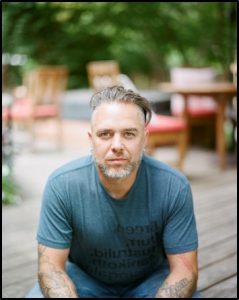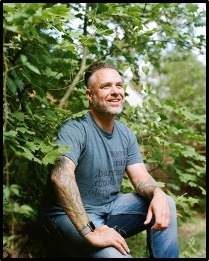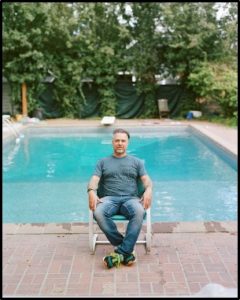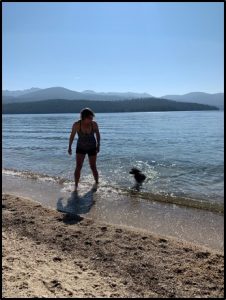EWU Faculty Perspectives
By Kasey Hermens, April 2021
The year of 2020 was defined by the COVID-19 virus, Zoom meetings, and masking up. Many conversations were centered on the student experience, and rightfully so, but there wasn’t much chatter about the impact on faculty members, as they zigged and zagged through the labyrinth of adaptation to a global pandemic. I wanted to shed some light on the perspectives of faculty, and open up the conversation to include both professors and pupils alike.
I interviewed two instructors and we spoke about both the hardships and the silver linings the past year made.
Travis Masingale
 An associate professor at Eastern Washington University, passionate about teaching Visual Communication Design courses and helping students achieve their goals. He considers himself a Bauhaus fanboy, a child of postmodernism, and a “specialist in obscure details.” He loves spending time reading books that get him thinking, spending time with his family, and escaping outside to hike the bluff.
An associate professor at Eastern Washington University, passionate about teaching Visual Communication Design courses and helping students achieve their goals. He considers himself a Bauhaus fanboy, a child of postmodernism, and a “specialist in obscure details.” He loves spending time reading books that get him thinking, spending time with his family, and escaping outside to hike the bluff.
Kasey: Thank you for meeting with me, I really appreciate your willingness to let me ask you some questions. Hopefully you have some insights that you’d have fun sharing. I’d first like to ask, what did your expectations look like when this transition to virtual learning happened about a year ago?
Travis: Oh, my expectations were low. I really lowered them… For myself, they were high because that’s just who I am but they were shifted to take care of the students and to provide space for the break from our normal routine. [I] really backed off and provided a space for reflection for the students, especially in our Design 200 class… [t]rying to create ways to tether students to school; to keep them coming back to the Zoom class, stuff like that.
 K: How have you managed your mental health during this time? I know mental health has been a big topic of discussion lately.
K: How have you managed your mental health during this time? I know mental health has been a big topic of discussion lately.
T: I’ve been meditating since the summer of 2016. I had a nervous breakdown and it was either get on more meds or stop meds and meditate. I started meditating and I had a pretty regular practice but I’d usually fall off at 90 days. So, last May was like, the lowest of low and I stopped meditating because I just couldn’t get out of bed in the mornings. I would just doom-scroll.
So, June 1st I committed and started [meditating] and a month went by, and another month, and then I was into August and was like, “Oh my God, I’m going,” so I decided, “I’m gonna do this for a year in the morning.” I haven’t stopped since June 1st .
I have my struggles too but my meditation practice in the past month has really grown about love and acceptance, and meeting people where they’re at. It’s hard in a student-centered space because we have this dual role as teachers where we’re supposed to push you as hard as we can to get students to do more than they expected they can. At the same time, we’re not supposed to break you. It’s this fine line of a balancing act, you know?
K: I know a lot of students have felt like they’ve missed out on the community aspect of college or university. Do you feel like faculty has missed out on that as well since everything has been remote learning?
T: For sure. In the fall and spring, it was like someone tied my arms behind my back. I am very empathetic, I read people, I’m sensitive, you know, if you will. Not being able to like, look at people’s faces, not being able to judge body language, and then not to have the community of students to get to know, it was really hard. Without that [sense of community], students would just be names on a roster and I don’t get to know their quirks. I get to know, maybe, their work visually but I don’t get to know them.
 I can’t imagine being a student right now, with the amount of technology that’s been thrown at students per class. Every faculty member is making this [stuff] up on their own, every department has some loose guidelines. As a student, the resiliency and the ability to adapt among this section of students for the past year… they are set for the modern world. They strengthened up that area of their mind and way of knowing the world. I think that all of us have atrophied this social aspect.
I can’t imagine being a student right now, with the amount of technology that’s been thrown at students per class. Every faculty member is making this [stuff] up on their own, every department has some loose guidelines. As a student, the resiliency and the ability to adapt among this section of students for the past year… they are set for the modern world. They strengthened up that area of their mind and way of knowing the world. I think that all of us have atrophied this social aspect.
K: Is there anything you’re looking forward to?
T: I’m just looking forward to this summer. I think… a bunch of us faculty, we didn’t take last summer off. I normally don’t work in the summer, I do personal research. We planned for fall quarter hardcore, and I know I’m looking forward to a breath of space and to not be on Zoom all day and worry about 90 human beings and whether I’m doing enough for them.
Dr. Sarah Mount
 Sarah is the program director of the Undergraduate Public Health Program at Eastern Washington University, teaching an array of public health education courses; ranging anywhere from program planning, to health disparities, to grant writing. In her free time, she enjoys teaching herself instruments like the banjo and ukulele, playing board games like Ticket to Ride, and being outdoors with her new addition to the family, her puppy named Otter.
Sarah is the program director of the Undergraduate Public Health Program at Eastern Washington University, teaching an array of public health education courses; ranging anywhere from program planning, to health disparities, to grant writing. In her free time, she enjoys teaching herself instruments like the banjo and ukulele, playing board games like Ticket to Ride, and being outdoors with her new addition to the family, her puppy named Otter.
Kasey: I appreciate that you’ve taken some time out of your day to meet with me. My first question is, what did your expectations look like when the transition to virtual learning happened this time last year?
Sarah: Boy, if it had been… if COVID had hit any other quarter it would have been awesome. Spring quarter, for me, was really the worst possible quarter to try to put those classes online, especially the program planning class, which I feel really takes a lot of work behind the scenes to do that well online. I’d become very, you know, dependent on seeing you guys every, you know, two days, right? Being able to really push our two hours together as far as I could. When I’m planning something online, you don’t have as good of a feel for the timing of it, right? You don’t want to overburden the students, but at the same time, you know, you have to get through a lot and you don’t want to undercut it. So, I was pretty much upside down a year ago this time. This spring is going a lot better. It was a learning experience.

 An associate professor at Eastern Washington University, passionate about teaching Visual Communication Design courses and helping students achieve their goals. He considers himself a Bauhaus fanboy, a child of postmodernism, and a “specialist in obscure details.” He loves spending time reading books that get him thinking, spending time with his family, and escaping outside to hike the bluff.
An associate professor at Eastern Washington University, passionate about teaching Visual Communication Design courses and helping students achieve their goals. He considers himself a Bauhaus fanboy, a child of postmodernism, and a “specialist in obscure details.” He loves spending time reading books that get him thinking, spending time with his family, and escaping outside to hike the bluff. K: How have you managed your mental health during this time? I know mental health has been a big topic of discussion lately.
K: How have you managed your mental health during this time? I know mental health has been a big topic of discussion lately. I can’t imagine being a student right now, with the amount of technology that’s been thrown at students per class. Every faculty member is making this [stuff] up on their own, every department has some loose guidelines. As a student, the resiliency and the ability to adapt among this section of students for the past year… they are set for the modern world. They strengthened up that area of their mind and way of knowing the world. I think that all of us have atrophied this social aspect.
I can’t imagine being a student right now, with the amount of technology that’s been thrown at students per class. Every faculty member is making this [stuff] up on their own, every department has some loose guidelines. As a student, the resiliency and the ability to adapt among this section of students for the past year… they are set for the modern world. They strengthened up that area of their mind and way of knowing the world. I think that all of us have atrophied this social aspect. Sarah is the program director of the Undergraduate Public Health Program at Eastern Washington University, teaching an array of public health education courses; ranging anywhere from program planning, to health disparities, to grant writing. In her free time, she enjoys teaching herself instruments like the banjo and ukulele, playing board games like Ticket to Ride, and being outdoors with her new addition to the family, her puppy named Otter.
Sarah is the program director of the Undergraduate Public Health Program at Eastern Washington University, teaching an array of public health education courses; ranging anywhere from program planning, to health disparities, to grant writing. In her free time, she enjoys teaching herself instruments like the banjo and ukulele, playing board games like Ticket to Ride, and being outdoors with her new addition to the family, her puppy named Otter.

